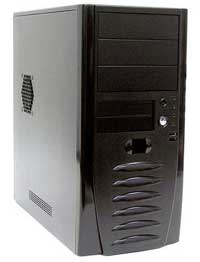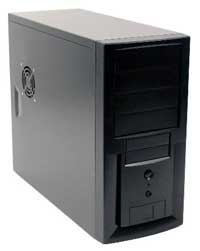Buyer's Guide - Entry Level, January 2005
by Jarred Walton on January 9, 2005 12:05 AM EST- Posted in
- Guides
Case and Power Supply
Choosing a case for the computer can be as simple or complex as you want to make it. For some, finding the cheapest $20 case available is all they're after, while for others, it will need to match the décor of their office/den/living room. You might also want to buy additional lights to spruce up your case, or more likely quieter fans to make your case less obtrusive. Considering that you'll spend a lot more time looking at your case - and hearing it - than at any of the internal components, we would encourage you to spend more rather than less.Budget-minded PC builders are more likely to stick with the cheaper cases, but we do recommend that you pick up a decent quality power supply if you purchase a $20 case. If you're shopping locally, comparing the weights of power supplies often says a lot about their quality - heavier is better. When shopping online, we would recommend a well-known brand like Antec, Enermax, Fotron Source, PC Power and Cooling, Tagan, and ThermalTake. There are other reliable brands as well, so ask around - our forum members are more than willing to offer their advice on any specific brand that you might be considering, and rather than trying to give a comprehensive list of every PSU available, we suggest that you ask there instead. Once you factor in the cost of a reasonable power supply - 350W is the minimum to buy, in our opinion - getting a better case with a quality power supply included is often as cheap as or cheaper than buying a low end case and adding in a power supply. Some sites (for example, DirecTron.com) will even allow you to custom select a power supply on any case that they offer, which is a nice feature, although the total savings may or may not make that the best option.
By the time that you factor in shipping, ordering a case online can become quite an expensive proposition. Shipping rates can easily cost as much as $25 or $30, depending on the site and weight of the case, so visiting a local shop may end up being a better choice. It might also allow you to check out power supplies, which is an added bonus.
Case Recommendation: Antec SLK1650B with 350W PSU
Price: $76 shipped
Once you factor in the cost of shipping and a reasonable power supply, we find it hard to beat the Antec SLK1650B case (also available in beige as the SLK1650). The advantages of the Antec 1650 are that it is well-built, it includes a relatively quiet power supply and 120 mm temperature controlled rear fan, and a CPU air duct that helps considerably with cooling the processor. With shipping adding almost $20 to the cost, however, it does hurt our overall budget. If you're willing to take the risk of a cheaper power supply, you can easily find cases at a local shop for under $50.
Case Alternative: RaidMax Elite ATX-208BP with 380W PSU
Price: $46 shipped
Our alternative budget case this time is the RaidMax Elite 208BP (available in beige as the 208P). You get what you pay for, and the overall quality of such a case is definitely inferior to the Antec 1650. However, particularly in a budget system, such a case and the included power supply should be more than sufficient. Remember that with the base budget system including integrated graphics as well as a slower processor and less RAM than a "high-end" system, the total power draw is likely to be well under 200W, even at load. The case itself is reasonably attractive, and it includes front USB ports and a side-mounted case fan that blows cool air directly at the processor. RaidMax makes a large variety of cases in many colors, and they are also one of the most inexpensive options. They won't win many awards for silence or innovation - particularly if you actually try running with all seven 80mm fan locations occupied - but they do well in meeting budget constraints.
Again, be forewarned that power supply failure in a year or so is a very real possibility, especially if you begin upgrading and adding additional components. Even the cheapest "quality" power supply will cost $30, equaling the cost of the Antec. Should you want to get a different case and buy a power supply (i.e. you like the way a case looks from the outside, even if the included PSU is junk), the list of PSU manufacturers above is a good place to start, and Fortron Source in particular has quite a few reliable models for $30 or so.
Quiet Fan Alternatives
Price: $5 to $20 plus shipping, depending on model
For those interested in a silent system, one of the best ways to achieve this goal is to get fans that make less noise. Panaflo's L1A series with their Hydro-Wave bearings are one such option, but in general, the best way to make a system quieter is to use fewer fans as well as fans that move less air. The movement of air makes a lot of noise, relatively speaking, and that noise usually more than drowns out that of the fan bearings. Typically speaking, 80 mm fans that spin at more than 2000 RPM are going to make a moderate amount of noise, and 120 mm fans should spin even slower than that (e.g. 1200 to 1500 RPM) as they inherently move more air. Another option for reducing fan noise is to get a voltage converter that will run your fans at 7V instead of 12V - it's just a different way of reducing the RPMs, really. Many motherboards can also adjust fan speeds automatically based on system temperatures, which work to varying degrees. We prefer to get fans with 3-pin motherboard connectors as well as all three wires - the third wire is used to monitor fan RPMs, and it is not always available (e.g. on the Panaflo fans). Antec and Enermax again make some good quality fans for a reasonable price, as do Vantec, Zalman, and several others; just check the RPM and CFM ratings and remember that higher values will equate to more noise. As with power supplies, asking around in our forums can give you more specific advice on any particular model.












31 Comments
View All Comments
mcveigh - Sunday, January 9, 2005 - link
nice selection, I love the SFF choices.